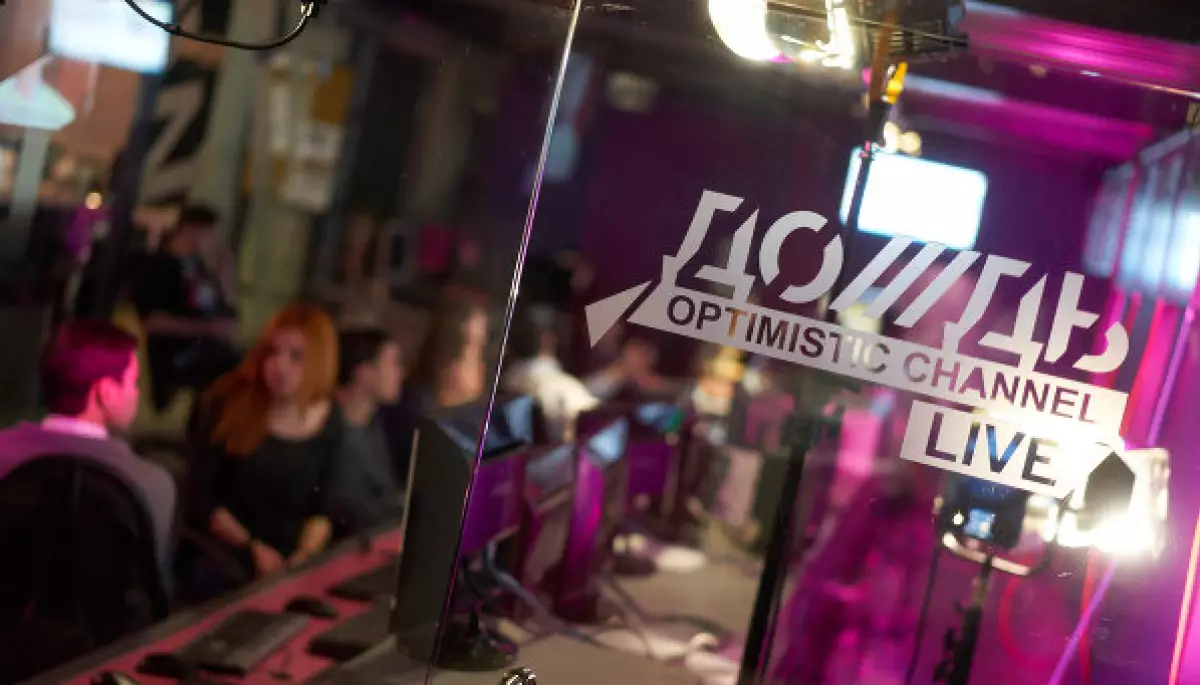War is a period of blurred ethical boundaries and at the same time a period of unambiguity.
The high-profile scandal with the Russian TV channel Rain (Dozhd) ended in tears for its General Director Natalia Sindeeva. Sindeeva concludes her emotional address to ex-employees — the fired journalist Alexey Korostelev and two of his colleagues who resigned in protest — with the words: "I want to stay a human being, not a piece of shit..."
So I want to express my view on how Russian citizens who claim to be anti-war and anti-Putin can remain human beings and not pieces of shit.
War is a period of blurred ethical boundaries and at the same time a period of unambiguity. War is a period when the complexity and diversity of the world are reduced to a binary number system, where there are only two values: 1 or 0 — "friend" or "foe".
There are times when this binary system may not be applicable; for example, when it can be unclear whether you are a "friend" or a "foe". These exceptions are, for example, intelligence agencies' operations in hostile environments or the actions of corrupt war profiteers.
As we do not consider the team of the TV channel Rain to be a spy ring (I am not able to state that it is not until the contrary can be demonstrated), or a corrupt organization, it is natural to assume that the TV channel Rain exists in the same binary system, where it is either a "friend" or a "foe".
This is the way evolution and our survival mechanisms work. And since genocide is being waged against the Ukrainian people, the ability to distinguish "friend" from "foe" is vital for us, Ukrainians.
The same can be said about the nations of the Baltic States and the European Union. After all, Russian aggression is declared not just against Ukraine but against the entire Western world, as Russian propagandists never cease to emphasize. The "friend-or-foe" recognition system is equally important for other nations that are under potential attack from the Kremlin.
In other words, if you are not a combatant, it does not mean that you can afford to be "above the fray". Otar Dovzhenko has written well and in detail explaining why such a model of behavior is absurd and senseless.
The war is between Russia and Ukraine. Russia is bombarding all Ukrainian citizens without exception with missiles and kamikaze drones, with no distinction made between combatants and noncombatants. Between children and adults. Whether a Ukrainian needs power for the operation of medical equipment that sustains his life; whether he can spend a couple of days without light, water, and heating.
This is a war of extermination. The only possible response to genocide can only be violence directed at the aggressor and all those who actively or inadvertently support him.
As for Alexey Korostelev, whose behavior became the trigger for the situation (note: not the cause, but the trigger), his watershed occurred in a completely different plane. According to Alexey himself, "Do I feel sorry for the hungry mobilized soldiers abandoned by everyone? Yes, I do. Is Putin a great guy? No. It seems that the watershed is somewhere around here".
To paraphrase this idea, "Putin, of course, is not a great guy, but I feel sorry for the mobilized". For me, and many of my compatriots and colleagues, this conceptualization of a "watershed" is completely and totally incompatible with the status of a "friend", and therefore it falls under the category of a "foe". That's all.
Undoubtedly, another excuse of Russian liberals is the words: "Well, everything is clear with the Ukrainians, they are emotionally affected, but the Latvians overreacted". This is a critical mistake, in my opinion, because the "friend-or-foe" system has particular relevance to Latvians. To understand this, watch the BBC documentary World War Three: Inside The War Room.
However, the Rain, which was supposed to become an ark for Russian liberal media, generously provided with money from European taxpayers, became a "foe" for reasons beyond Korostelev's mistake alone. Thus, for example, on July 5, 2018, Lilia Yapparova, a correspondent of the TV channel Rain, who works for the Meduza publication, told the viewers of the TV channel that her sources informed her about the existence of a private military company called Patriot.
Lilia Yapparova has been writing about Yevgeny Prigozhin and the Wagner Group for a long time and is one of the world's best experts on Prigozhin's mercenaries. In March-April 2022, she was a reporter for Meduza covering Russian military atrocities in the Kyiv region.
But in 2018, it was the TV channel Rain that became the primary source of information about the alleged involvement of the Patriot PMC in the murder of the journalist group of Orhan Dzhemal in the Central African Republic.
A year before, the website of the TV channel Rain disseminated information about the emergence of another private military company Turan, republishing this information from the website of "Moskovsky Komsomolets", which is under the direction of the Main Intelligence Directorate of the Russian Ministry of Defense.
Both names – Patriot and Turan – turned out to be fake cover-ups for the special operations forces of the Russian army, who realized that posing as a private military company, they could kill, rape, and defile the bodies of the dead with impunity. Later on, the "legend" that was created in the headquarters of the Russian army was eventually refuted by the media, and often by the same media that reported on the existence of these private military companies.
So at the very least, Russian journalists were used without their knowledge, and fed disinformation, which they then spread. Thus, they became a tool in the hands of the enemy.
The same applies to mass media publications referring to the agents of the Russian special services in the occupied territories of Ukraine. Thus, for example, on the Rain TV channel's website, the henchman of the Russian special services Denis Pushilin is quoted about 500 times, and the Kremlin's aggression against Ukraine is systematically called the "Ukrainian crisis".
Perhaps Alexei Korostelev's phrase was a mistake, and every journalist can make mistakes. But the decision of the National Electronic Media Council of Latvia was based on at least three documented "mistakes". I can name hundreds of such mistakes that Rain did not pay attention to, because no one was going to punish it for those mistakes until February 24, 2022.
The "friend-or-foe" recognition system that was triggered in Latvia has a profound and tectonic significance for the entire European system of support for the Russian liberal opposition.
In the European Parliament, there are regular and loud calls to establish an official presence of the Russian liberal opposition at the European intergovernmental institutions. In particular, in the very premises of the European Parliament.
Thus, according to Russian expert Fyodor Krasheninnikov, the recognition of the Russian opposition and its leaders in Europe by the European Parliament could provide legitimacy to their leaders. Since, according to him, neither the Free Nations of Russia Forum, the Congress of People's Deputies led by Ilya Ponomarev, nor even the Free Russia Forum can claim such legitimacy.
According to the logic of the Russian opposition, since they live on the territory of the EU member states and the EU member states recognize their documents and acknowledge their presence on their territory, who else but the European Parliament should recognize the presence of an official presence of the Russian opposition in its premises?
However, now, after the decision of the National Council of Electronic Media of Latvia, which is also an EU member state, the Russian liberal opposition calls not to recognize and ignore this decision. Moreover, the Latvian authorities have already been compared to both Putin's regime and ultra-radical Russophobes.
The question arises why the Russian liberal opposition is so eager to get the desired legitimacy from the European Union but refuses to accept the decision of a fully legitimate European regulator, which is not in its favor.
The answer to this question is simple: the Russian liberal opposition cannot define its place in the "friend-or-foe" system. This behavior is due to a great desire to please the Russian audience, nourishing its Stockholm syndrome about Putin's terrorist regime, instead of treating this syndrome.
As opposed to convincing the Russian audience that it is unacceptable to actively participate in crimes against the Ukrainian people, they are trying to "buy" this audience with sympathy for the mobilized slaves who are forced to commit genocide by the terrorist regime.
In her video, as she weeps sincere tears, Natalia Sindeeva says that "the TV channel has never wh&red out" and asks her employees to return. Because what Sindeeva considers "wh&ring out" is not the support of the Russian mobilized, but the betrayal of her own colleagues.
That is why her statement proves that Sindeeva understands how the "friend-or-foe" system works. She knows that "friends" are not to be betrayed. And this makes her feel very bad. And she cannot hold back tears. And I sincerely understand her.
But if you understand what "friend-or-foe" means, you should also understand how it works at the macro level during a war.
What the TV channel and those who support it are doing now is proof that all these people have failed to choose a side. They deliberately want to choose the third way and promote their strategy by criticizing the Latvian government for not liking the rhetoric in support of the genocide perpetrators.
Unfortunately, we cannot allow this.
The only option for the future of the European continent can be only a military victory of Ukraine over Russia and the transformation of the Russian Empire into something else.
And I am ready to discuss the transformation of Russia into this "something else" with representatives of the TV channel Rain, and with any Russians who can accept the inevitability of the Ukrainian victory, that can only be achieved through violence against the aggressor — that is, removing the Russian soldiers from Ukrainian territory, capturing them, wounding them or killing them.
This is our watershed, not Korostelev's words that "Putin is not a great guy". And this should be the watershed for any civilized nation, starting with Latvia and ending with every EU member state.
TV channel Rain can continue to exist. As well as the peoples inhabiting Russia will continue their peaceful and quiet existence. But only after the victory of Ukraine and the transformation of the empire into a normal, safe state for everyone around.
If Rain finds the strength to transform, change, and locate itself in the coordinates of the "friend-or-foe" system, its broadcasting should be restored. Including, perhaps, within the framework of what the Minister of Culture Oleksandr Tkachenko calls the "information Ramstein", within the editorial policy and on terms agreed upon with Ukraine.
Photo courtesy of Rain TV channel




